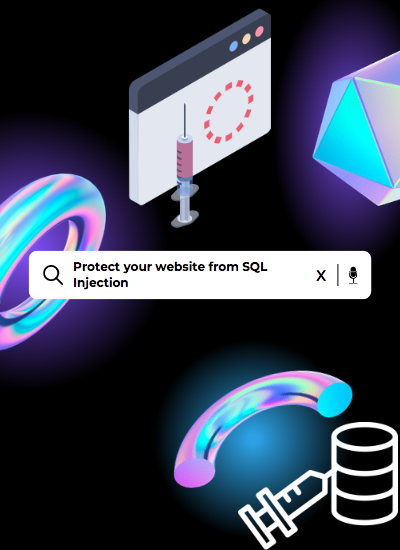SQL injection attacks are one of the most common and devastating forms of cyber attacks that can lead to data breaches and loss of sensitive information. As a website owner or developer, it’s essential to protect your website from SQL injection attacks to ensure the security and privacy of your users’ data.
Here are some best practices you can use to protect your website from SQL injection attacks:
- Use Prepared Statements
Prepared statements are an effective way to prevent SQL injection attacks. Prepared statements can be used in most popular programming languages, including PHP, Java, and Python. Prepared statements allow developers to create a query template with placeholders for user input, and then bind the user input to the placeholders, which are automatically escaped by the database driver.
Here is an example of how to use prepared statements in PHP:$stmt = $pdo->prepare('SELECT * FROM users WHERE username = :username')
$stmt->execute(['username' => $username]);
$user = $stmt->fetch();
Here is an example of how to use prepared statements in Java using JDBC:PreparedStatement stmt = conn.prepareStatement("SELECT * FROM users WHERE username = ?");
stmt.setString(1, username);
ResultSet rs = stmt.executeQuery();;
And here is an example of how to use prepared statements in Python using the psycopg2 library:cursor = conn.cursor()
stmt = "SELECT * FROM users WHERE username = %s"
cursor.execute(stmt, (username,))
user = cursor.fetchone() - Sanitize User Input
Another effective way to prevent SQL injection attacks is to sanitize user input. Sanitizing user input means validating and filtering user input to ensure that it conforms to expected patterns and formats. Sanitizing user input can be done using regular expressions, built-in PHP functions like filter_var() and ctype_digit(), or third-party libraries like HTML Purifier. - Limit User Privileges
Limiting user privileges is another important step in preventing SQL injection attacks. Ensure that users only have access to the data and functionality that they need, and no more. This can be achieved by using role-based access control (RBAC) or attribute-based access control (ABAC) techniques. - Keep Your Software Up-to-date
Keeping your software up-to-date is also crucial in preventing SQL injection attacks. New vulnerabilities are discovered all the time, and software vendors regularly release security patches to fix these vulnerabilities. By keeping your software up-to-date, you can ensure that you have the latest security patches and fixes installed.
Conclusion:
Protecting your website from SQL injection attacks is critical for ensuring the security and privacy of your users’ data. By following the best practices outlined above, you can minimize the risk of these attacks and keep your website and users safe.
